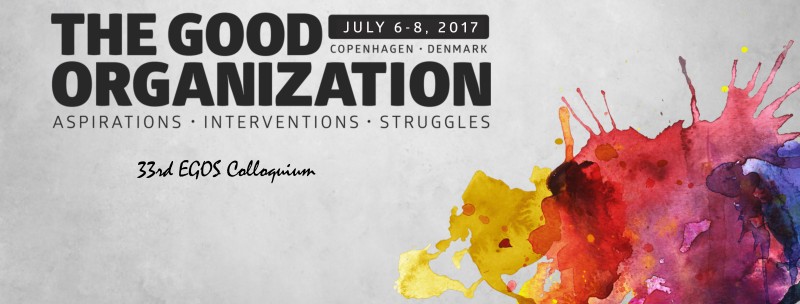Sub-theme 14: De/Humanisation and Organization
Call for Papers
In many ways, our current epoch witnesses dehumanized social relations. While alienation (Marx), disenchantment (Weber)
and the deficit in social solidarity (Durkheim) are by no means recent phenomena, processes of dehumanization continue to
prevail in most spheres of society. In the public sphere, discussions privilege compliance with bureaucratic regulations and
quantifiable indicators (such as GDP and its growth) over human needs and flourishing, have the effect of excluding large
portions of the electorate from public debate while accelerating the demise of the Welfare State. More recently, Western countries’
securitarian and paranoid responses to terrorist attacks have reinforced a climate of generalized suspicion in which the neighbour
is deemed to be a potential enemy (Zizek, 2009).
In the economic sphere, the financialization of the economy
and the spread of market ownership privilege economic profitability over human well-being. Corporate Social Responsibility
is thus deployed mostly as a rhetorical device whose injunctions are followed as long as they are profitable to corporate
shareholders. Yet, any contemporary observer of capitalism witnesses suffering, destitution and ethical corrosion, both in
richer and in poorer countries. Equally worryingly, the private sphere also seems to have undergone dehumanization: for instance,
impersonal relations are the lot of ever-growing urban centres, whilst familial duties of care are gradually replaced either
by indifference or by reliance on salaried transactions with professional carers (Hochschild, 2003).
The dehumanization of society is mirrored,
and perhaps intensified, by the exclusion of the notion of ‘human’ and ‘humanity’ from the social sciences and humanities
in the second half of the 20th Century. While philosophers such as Foucault, or more recently Butler, have warned
against taken for granted conceptions of the human, their warnings seem to have produced effacement, rather than problematization,
of the category of ‘human’. This is especially evident in a variety of anti- or post-humanist theorising, which either dissolves
human persons into their wider material, discursive or communicative contexts, or alternatively conceptualises humanity only
as an aggregate of neurological, psychological or material components.
There exist, however, significant
exceptions to this trend. Neo-Aristotelian philosophers such as Sen and Nussbaum have developed political philosophies that
place human capabilities at the centre of the stage. In feminist studies, Lawson (2009) advocated ‘minimal humanism’ and in
sociology Archer (2000), Sayer (2011) and Smith (2010) have taken stock of the absence of human subjects from social scientific
accounts and sketched the contours of a humanist social science. On the post-structuralist front, Butler’s studies of derealization
and dehumanization (Butler 2004; 2009) mark a reinstatement of the category of the ‘human’ that remains conscious that norms
of humanity can produce violence on those persons who do not fit them.
The major purpose of this sub-theme
is to explore the dehumanizing effects of contemporary organizations but also the potential of organizations to rehumanize
social relations. We welcome a range of theoretical and empirical contributions on processes of humanization/dehumanization
addressing, amongst other issues, the following:
- How do contemporary modes of organizing and organization contribute to dehumanize people? For instance, to what extent is the largely studied dark side of management amenable to dehumanization? What is gained by doing so? But, equally importantly, which aspects, if any, are not reducible to dehumanization?
- Conversely, what contemporary movements and novel modes of organizing might contribute to enhance human flourishing and dignity? For instance, how are social movements centered on human dignity such as the Spanish Indignados readdressing the human side of social relationships? How are cooperatives and alternative organizations of work, care and political involvement developing credible instances of resistance to dehumanizing tendencies?
- Is the concept of the ‘human’ still a useful ethical category when assessing the ‘good’ organization? Does it make sense to wager, with Foucault, that ‘man would be erased, like a face drawn in sand at the edge of the sea’? Is ‘humanity’ merely an empty signifier prone to endless re-appropriation and whose value is at best tactical but never foundational for social and organizational theories and politics? Or is the notion of humanity, and associated ‘powers’, ‘rights’ and ‘flourishing’, a useful standard when assessing and criticizing organizations and societies?
- What are the new struggles arising from the attack on dignity and from the exclusion processes that are largely shaping capitalistic societies?
- Have the boundaries of what people regard as a dehumanizing treatment shifted? Have we become more willing, for instance, to disregard outrage in the name of economic and military security?
- The dehumanization of bureaucratic organizations has been extensively studied since Weber and Gouldner. But is the emergence of hybrid or post-bureaucratic organizations a safeguard against dehumanization? Or do these novel organizational forms merely shift the modalities of dehumanization?
- What is the role of information technologies in processes of dehumanization?
References
- Archer, M.S. (2000): Being Human. Cambridge: Cambridge University Press.
- Butler, J. (2004): Precarious Life: The Powers of Mourning and Violence. London: Verso.
- Butler, J. (2009): Frames of War: When is Life Grievable? London: Verso.
- Hochschild, A.R. (2003): The Managed Heart: Commercialization of Human Feeling. Twentieth Anniversary Edition. Berkeley: University of California Press.
- Lawson, T. (2009): “Feminism, realism and essentialism. Reply to Van Staveren.” In: E. Fullbrook (ed.): Ontology and Economics. Tony Lawson and His Critics. London: Routledge, 311–324.
- Sayer, A. (2011): Why Things Matter to People: Social Science, Values and Ethical Life. Cambridge: Cambridge University Press.
- Smith, C. (2010): What is a Person? Rethinking Humanity, Social Life and the Moral Good from the Person up. Chicago: Chicago University Press.
- Zizek, S. (2009): Violence. Six Sideways Reflections.
London: Profile Books.


